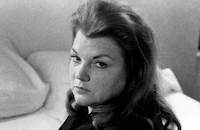Seven Beauties

Brief Synopsis
Cast & Crew
Lina Wertmuller
Giancarlo Giannini
Fernando Rey
Shirley Stoler
Elena Fiore
Piero Ditorio
Film Details
Technical Specs
Synopsis
In 1930s Italy, Pasqualino, a low-level Sicilian thug, kills a man who disgraced his sister. Pasqualino pleads insanity and manages to escape imprisonment by joining the military, but he decides to go AWOL when things get too heavy. Unfortunately, he finds himself stuck in a concentration camp. Pasqualino vows to do anything in order to survive even if that means seducing an obese, female German camp commandant or ratting out his own pals.
Director

Lina Wertmuller
Videos
Movie Clip



Film Details
Technical Specs
Award Nominations
Best Actor
Best Director
Best Foreign Language Film
Best Writing, Screenplay
Articles
Seven Beauties -
By Lorraine LoBianco

Seven Beauties -
Quotes
Trivia
The ratio of film shot to film actually used in the final cut was 50 to 1.
Miscellaneous Notes
The Country of Italy
Released in United States 1975
Released in United States August 23, 1990
Released in United States March 1976
Re-released in United States April 14, 2017
Released in United States March 1976 (Shown at FILMEX: Los Angeles International Film Exposition (Contemporary Cinema) March 18-31, 1976.)
Re-released in United States April 14, 2017
Released in United States 1975
Shown at Lincoln Center, New York City in the series "A Roman Holiday" August 23, 1990.
Released in United States August 23, 1990 (Shown at Lincoln Center, New York City in the series "A Roman Holiday" August 23, 1990.)
















